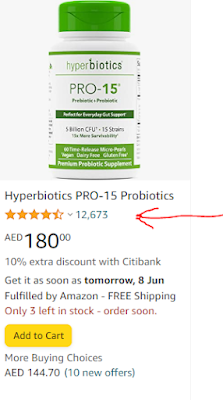What is Probiotics:
Probiotics are live microorganisms, including beneficial bacteria and yeasts, that provide health benefits when consumed in adequate amounts. These "good" bacteria help maintain a healthy balance in the gut microbiota, supporting digestion, immune function, and overall well-being. By promoting a diverse microbial ecosystem in the gut, probiotics contribute to optimal gut health.What are the complications that come when you don't have enough probiotics as a woman?
When women do not have enough probiotics in their system, it can lead to several complications and imbalances in the body. Here are some potential consequences:
Vaginal infections: Probiotics play a crucial role in maintaining a healthy vaginal microbiota. When there is an imbalance in the vaginal flora, it can lead to infections such as yeast infections (Candida overgrowth) and bacterial vaginosis. A lack of beneficial bacteria, such as Lactobacillus species, can contribute to these imbalances.
Urinary tract infections (UTIs): Probiotics, particularly Lactobacillus rhamnosus and Lactobacillus acidophilus, can help prevent UTIs by supporting a healthy urinary tract and inhibiting the growth of harmful bacteria. Insufficient levels of these probiotics may increase the risk of UTIs.
Digestive issues: Probiotics play a crucial role in maintaining a healthy gut microbiota, which aids in digestion and nutrient absorption. When there is a lack of beneficial bacteria, it can lead to digestive issues such as bloating, gas, constipation, or diarrhea.
Weakened immune system: Probiotics are known to support immune function. Insufficient levels of probiotics can compromise the immune system's ability to defend against infections and may lead to increased susceptibility to illnesses.
Poor nutrient absorption: A healthy gut microbiota helps break down and absorb nutrients from the food we consume. When there is a lack of beneficial bacteria, it can affect the body's ability to absorb essential nutrients, leading to potential nutrient deficiencies.
Increased inflammation: Imbalances in the gut microbiota, resulting from insufficient probiotics, can contribute to increased gut inflammation. Chronic inflammation in the body is associated with various health conditions and can negatively impact overall well-being.
Mood imbalances: Emerging research suggests a connection between gut microbiota and mental health. Insufficient probiotics may contribute to an imbalance in the gut-brain axis, potentially influencing mood and mental well-being.
It's important to note that individual experiences may vary, and the impact of insufficient probiotics can depend on various factors such as overall health, diet, and lifestyle. Incorporating probiotic-rich foods or considering probiotic supplementation under the guidance of a healthcare professional can help restore balance and support optimal health.
Lactobacillus acidophilus: This probiotic strain is commonly found in the vaginal microbiota and helps maintain a healthy vaginal pH, preventing yeast infections and bacterial vaginosis. It can be found in various probiotic supplements and yogurts. Studies have shown that L. acidophilus supplementation can help restore vaginal flora and support women's reproductive health.
Here are 15 probiotics that are often recommended for women and why you may need them
Lactobacillus rhamnosus: Known for its immune-enhancing properties, L. rhamnosus can help support a healthy immune system and prevent urinary tract infections (UTIs). It has been extensively studied for its ability to reduce the risk of UTIs, particularly in women. L. rhamnosus is available in probiotic supplements and certain fermented foods.
Lactobacillus plantarum: This probiotic strain supports gut health, aids in digestion, and can help alleviate symptoms of irritable bowel syndrome (IBS). L. plantarum has been shown to reduce gut inflammation and improve gut barrier function. It is commonly found in probiotic supplements and fermented foods like sauerkraut.
Bifidobacterium lactis: B. lactis is known for its ability to support digestive health, boost the immune system, and reduce gastrointestinal discomfort. It can help improve lactose digestion, alleviate symptoms of lactose intolerance, and promote overall gut health. B. lactis is available in probiotic supplements and yogurt.
Lactobacillus casei: This probiotic strain may help support a healthy balance of bacteria in the gut, promote regular bowel movements, and alleviate symptoms of diarrhea. L. casei has been studied for its potential in managing gastrointestinal disorders and improving gut transit time. It is commonly found in probiotic supplements and some dairy products.
Bifidobacterium breve: B. breve can help support gut health, improve digestion, and alleviate symptoms of constipation and bloating. It has been shown to have antimicrobial properties and can help restore microbial balance in the gut. B. breve is available in probiotic supplements and some fermented foods.
Lactobacillus reuteri: This probiotic strain has been found to support vaginal health by inhibiting the growth of harmful bacteria and promoting healthy vaginal flora. It may help prevent bacterial vaginosis and urinary tract infections. L. reuteri can be found in specific probiotic supplements formulated for women's health.
Saccharomyces boulardii: Though technically a yeast, S. boulardii is considered a beneficial probiotic. It can help prevent antibiotic-associated diarrhea and support digestive health. S. boulardii works by binding to pathogens in the gut, enhancing the intestinal barrier function, and modulating the immune response. It is available in specific probiotic supplements.
Streptococcus thermophilus: This probiotic strain aids in lactose digestion and may help alleviate symptoms of lactose intolerance. S. thermophilus produces lactase, the enzyme responsible for lactose breakdown. It is commonly found in yogurt and some probiotic supplements.
Lactobacillus fermentum: L. fermentum has been shown to support vaginal health, prevent urinary tract infections, and reduce inflammation. It produces antimicrobial substances that help maintain a healthy vaginal flora. L. fermentum is available in certain probiotic supplements.
Bifidobacterium longum: Known for its ability to support the immune system, B. longum can also help reduce gastrointestinal inflammation and support overall gut health. It has been studied for its potential in managing inflammatory bowel diseases and promoting a balanced immune response. B. longum is commonly found in probiotic supplements.
Lactobacillus gasseri: This probiotic strain may support weight management and help reduce belly fat by promoting healthy gut microbiota. Some studies suggest that L. gasseri supplementation can lead to modest reductions in body weight and waist circumference. It is available in specific probiotic supplements.
Lactobacillus crispatus: L. crispatus is commonly found in healthy vaginal microbiota and plays a crucial role in maintaining vaginal health and preventing infections. It produces lactic acid, creating an acidic environment that inhibits the growth of pathogens. L. crispatus can be found in specific probiotic supplements designed for women's health.
Bifidobacterium bifidum: B. bifidum can help support immune function, improve digestion, and reduce symptoms of IBS. It has been shown to modulate the immune response and promote a balanced gut microbiota. B. bifidum is available in probiotic supplements and some fermented foods.
Lactobacillus helveticus: This probiotic strain has been studied for its potential mood-enhancing effects and may help reduce symptoms of anxiety and depression. It is believed to influence neurotransmitter production and gut-brain communication. L. helveticus can be found in specific probiotic supplements formulated for mental health.
Please note that the availability of these probiotic strains may vary depending on your location and the brands of supplements or food products available to you. It's recommended to consult with a healthcare professional before starting any new supplement regimen.
Additionally, probiotics can be obtained naturally through various food sources.
Here are ten foods that contain probiotics:
- Yogurt: Contains live and active cultures of beneficial bacteria.
- Kefir: A fermented milk drink that provides a wide range of probiotic strains.
- Sauerkraut: Fermented cabbage that is rich in Lactobacillus bacteria.
- Kimchi: A traditional Korean dish made from fermented vegetables.
- Tempeh: Fermented soybean product that contains probiotics.
- Miso: A fermented paste made from soybeans, barley, or rice.
- Kombucha: A fermented tea that contains a variety of probiotic strains.
- Pickles: Fermented cucumbers that can provide probiotic benefits.
- Sourdough Bread: Made with a natural fermentation process that introduces probiotic cultures.
- Cheese: Some types of cheese, such as Gouda and Cheddar, contain probiotics.
Now, let's move on to the frequently asked questions about probiotics:
What are probiotics? Probiotics are live bacteria and yeasts that are beneficial to our health, especially our digestive system. They help maintain a balanced gut microbiota and support various aspects of health.
How do probiotics work? Probiotics work by colonizing the gut and interacting with the body's natural microbial community. They can enhance gut barrier function, modulate the immune response, produce beneficial substances, and compete with harmful bacteria.
What are the benefits of taking probiotics? Probiotics have been associated with numerous health benefits, including improved digestion, enhanced immune function, reduced risk of infections, relief from gastrointestinal discomfort, and support for vaginal health.
Are there any side effects of taking probiotics? Most people can take probiotics without experiencing any side effects. However, some individuals may initially experience mild digestive symptoms such as gas, bloating, or changes in bowel movements. These symptoms typically subside as the body adjusts.
How should I choose a probiotic supplement? When choosing a probiotic supplement, consider the specific strains and their intended benefits, the number of live organisms (CFUs), the packaging and storage requirements, and any additional ingredients or allergens. It's also advisable to consult with a healthcare professional for personalized recommendations.
Can I take probiotics while pregnant or lactating? Pregnant and lactating women can generally take probiotics, but it's important to consult with a healthcare professional beforehand. Certain strains may be more suitable during pregnancy or breastfeeding, and dosage recommendations may vary.
Can probiotics be taken with antibiotics? Yes, probiotics can be taken alongside antibiotics. Antibiotics may disrupt the natural gut microbiota, and probiotics can help restore balance. However, it's recommended to take them at separate times to ensure the antibiotics do not directly interfere with the viability of the probiotics.
How long should I take probiotics? The duration of probiotic supplementation can vary depending on individual needs and health conditions. Some people take probiotics for short periods to address specific issues, while others incorporate them into their daily routine for long-term gut health support. Follow the instructions provided with the specific product or consult with a healthcare professional.
Can children take probiotics? Probiotics can be beneficial for children, but it's advisable to choose age-appropriate formulations and consult with a pediatrician before starting probiotic supplementation for children.
Are probiotics safe for older adults? Probiotics are generally safe for older adults. In fact, they may offer particular benefits for maintaining gut health and supporting the immune system in older individuals. However, it's recommended to consult with a healthcare professional, especially if there are underlying health conditions or medications involved.
Regarding the impact of probiotics on pregnant women, lactating mothers, and aged individuals:
Pregnant women: Probiotics can be beneficial for pregnant women as they help maintain a healthy gut microbiota and support immune function. Certain strains, such as Lactobacillus rhamnosus and Lactobacillus acidophilus, have been studied for their potential in reducing the risk of gestational diabetes, preventing vaginal infections, and support maternal and fetal health. However, it's important to consult with a healthcare professional before starting any probiotic supplementation during pregnancy.
Lactating mothers: Probiotics can be safely consumed by lactating mothers and may offer benefits for both the mother and the breastfeeding baby. Studies suggest that probiotic supplementation during lactation can help reduce the risk of allergic conditions in infants and support breastfeeding mothers' gut health. It's recommended to choose probiotics specifically formulated for postpartum and lactation periods and consult with a healthcare professional.
Aged individuals: Probiotics can be particularly beneficial for older adults as they support digestive health, help maintain a balanced gut microbiota, and enhance immune function. Age-related changes in the gut microbiota and immune system can impact overall health, and probiotics can help mitigate these effects. Bifidobacterium and Lactobacillus strains are commonly used in probiotic supplements for older adults. However, it's advisable to consult with a healthcare professional, especially if there are underlying health conditions or medications involved.
Please note that while probiotics have shown promising benefits, individual results may vary. It's always recommended to consult with a healthcare professional for personalized advice and recommendations based on your specific health needs.
Recommended Probiotic Product:
 |
| See on Amazon |
One highly-rated probiotic product on Amazon is "Hyperbiotics PRO-15 Probiotics." This best-selling probiotic contains 15 targeted probiotic strains, features a time-release delivery system, and is formulated to survive harsh stomach acid and reach the intestines effectively.
















0 Comments